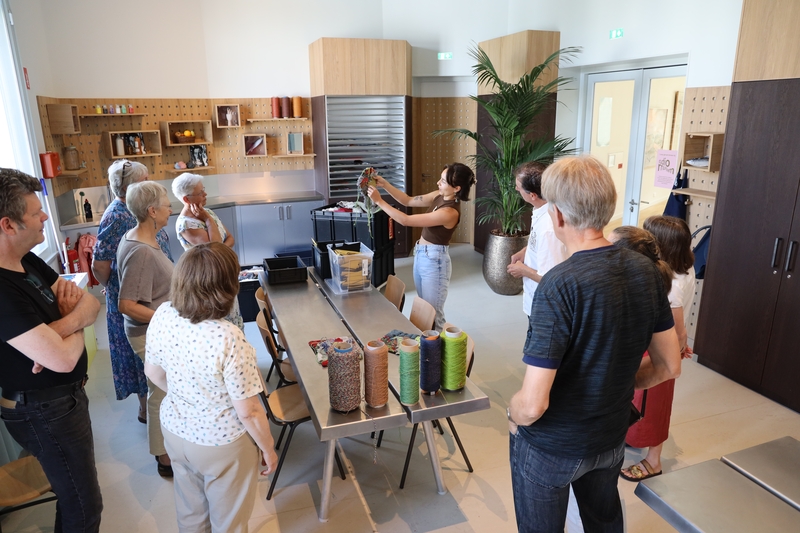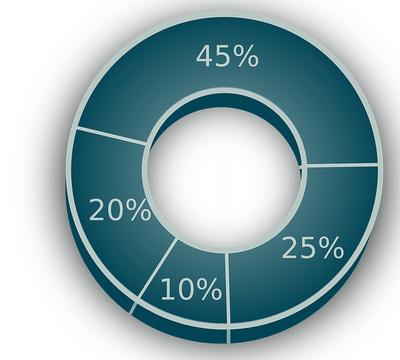
A convivial group just shy of a dozen SENSE members met on Wednesday 9 November over Zoom to discuss the evening’s theme, ‘How do we translate?’. (Although it’s still called the Utrecht SIG, attendees hailed from all over the Netherlands, and one digital nomad is currently on the Isle of Man!) More specifically, do we plough through the translation quickly, creating a rough first draft, or do we have to get it perfect on the first go? Do we do research as we go along, or before we actually start translating? What tools do we use? And how many passes do we make before finalizing the translation?
Convener Jenny Zonneveld had been inspired by an interesting keynote talk at a translation conference involving three literary translators. The first had put up a screen shot of a typical first-draft paragraph for him, in which he had not only typed out several options for some words but also capitalized other words – and quite a few of them – that he would look up later. The second translator used to do this, but now starts by putting the entire text through DeepL to get a ’pre-translation’. He shared donut charts showing the percentage of time spent on various tasks using his old and new methods. His first draft used to take about 66% of the total translation time. DeepL reduced the first draft to 3% of the total translation time, with the rest divided between cleaning up the first version and a spell check. (He didn’t say whether this new method actually saves time overall or just redistributes the same amount of time over different activities, but we assume it does or he wouldn’t be using it.) The third translator uses MemoQ, working segment by segment and occasionally leaving a bit to look up later.
Those present at the Utrecht SIG meeting were a mixed bag as far as our approaches. Most of us use one or more computer-aided translation tools. Some of us don’t, as the texts we deal with aren’t helped by it, or because the potential for major mistakes is too great, eg, with legal texts, which one translator said have to refer specifically to Dutch law and have to be ultra-precise. Many of us post-edit machine translation (MT) texts. SENSE member Samuel Murray has posted on the forum about checking a list of names of medicines which the client had put through MT. Although it sounds pretty straightforward and certainly like a time-saver, the program had skipped bits and translated a number of names incorrectly. Out of curiosity, Samuel put it through Google Translate, which botched it in a different way.
Other tips and tricks we shared:
- Take time away from the job: We agreed that coming back to look at the first draft with a fresh pair of eyes is invaluable. However, we do not always have that luxury. One member said he normally has very tight deadlines, and by the time he’s finishing his first draft, his deadline is approaching.
- Have the right hardware: We had a brief discussion of mouses and even a vertical version called a Penguin (Fellowes makes it; your hand is turned vertically, which reduces wrist strain) which one member found extremely helpful.
Read your translation aloud: obviously you can’t do this for a whole book, but for short texts it’s useful for making sure you’ve got tone and rhythms right. - Dictate your translation using either your computer’s speech-to-text function or a separate program or online service. This can save time typing and reduce hand strain. It requires a different way of thinking about your text, however, and takes time to get used to.
All in all, we agreed that there are many roads to Rome, and that we all have different needs and limitations, and that whatever works for you is fine!
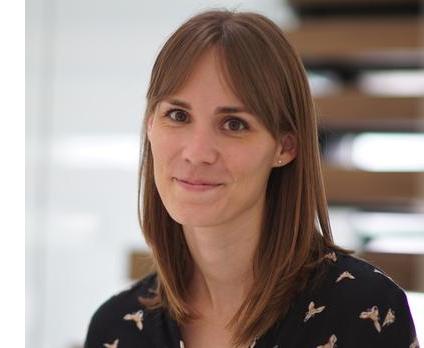
On 12 December 2022, Susie Jackson gave a workshop for SENSE on pricing and negotiating with confidence. During this online event, participants learnt what to consider and avoid when pricing their services and how to negotiate with clients who can’t afford to pay one’s rate.
We’re really excited about Susie sharing her knowledge and experience on this topic with us and hope it will help participants feel more confident about pricing their services going forward.
Below, Susie tells us more about her work and her workshop.
Could you tell us a bit about yourself and your background as a language professional?
I started freelancing as a translator and copy editor in 2015 alongside a full-time job as a university administrator. I had done a degree in Spanish and Portuguese but hadn’t found a way to use my languages as part of my career up to that point, so I was happy to have a linguistic outlet in my spare time. After about six months of working in that way, I decided I was really enjoying my freelance work and decided to take that full time. Over the years, I have specialized in academic translation and copy editing for the social sciences, and I now work almost exclusively with academic clients. Most of my work now comes via word of mouth.
How did you get into mentoring other freelancers?
In 2019, after I’d been freelancing full time for over 3 years, I felt there was something missing from my work life – I really missed the human connection I had previously got from my job. I started to think about how I might like to spend my time if I only had a few months to live (morbid I know, but it was inspired by a story in a TV programme I was watching at the time!). The conclusion I came to was that I would want to spend it sharing my knowledge and skills with as many people as possible. That was when I started mentoring other freelancers on finances and pricing, initially on a pro-bono basis, and I’ve combined the two parts of my business ever since.
What are some common issues freelancers run into when it comes to pricing and negotiating with confidence?
The most common problem I see among freelancers is a sense of not really knowing what to charge and therefore plucking numbers out of the air. Many freelancers (particularly those who work with words!) believe they are inherently bad with numbers, which leads to them avoiding even looking at their finances. I am a firm believer that familiarity breeds confidence, so the first step to gaining confidence with your finances is to become familiar with what they look like for you. Another really common problem is the anxiety that so many freelancers feel when they think about having to discuss money, and that can have a real impact on the quotations they send or even the way they market their business. I’ve come across people who are so afraid of having to discuss the money side of things with new clients that they prefer to continue working with their existing (often low-paying) clients rather than seek out better-paying ones. And that also means it can be really hard to discuss raising their prices too.
On 14 September, the Utrecht SIG met online to talk about Simplified English. Recently, one of our group had been asked to edit some FAQs and operating instructions for a machine manufacturer’s website. Usually, this kind of editing would involve imposing Plain English, but this time the request included a reference to Simplified Technical English, so some research was required before setting out on this editing adventure.
What is Simplified Technical English?
Simplified Technical English (STE) is an international specification that can be applied when preparing technical documentation. It’s what’s known as a controlled language. The specification consists of writing rules for grammar and style and a dictionary with words which writers are allowed to use, including usage examples.
STE was developed primarily for use in the aerospace industry because of the risk to human lives if systems do not operate safely and correctly. The specification spans more than 400 pages and is intended to be used alongside other style guides and directives.
STE can also help with technical translation from English because its vocabulary, word meanings and sentence structure are controlled. So, in theory, texts written in STE should be easier to translate.
How does STE compare to Plain English?
Plain English and Simplified Technical English both aim to produce clear writing. STE is a rules-based specification for writing procedures and includes a dictionary of approved terms to reduce ambiguity.
Plain English, or any ‘plain’ language, is written with the reader in mind, is clear and concise and written in the right tone of voice for the intended audience. Plain language has been adopted by organisations and governments all around the globe.
Common rules
Both STE and Plain English base their writing rules on the six rules George Orwell condensed into his guidance to writers. Many will agree these rules are just as valid today as when Orwell first published them in 1946.
i. Never use a metaphor, simile, or other figure of speech which you are used to seeing in print.
ii. Never use a long word where a short one will do.
iii. If it is possible to cut a word out, always cut it out.
iv. Never use the passive where you can use the active.
v. Never use a foreign phrase, a scientific word or a jargon word if you can think of an everyday English equivalent.
vi. Break any of these rules sooner than say anything outright barbarous.
(From Orwell's essay Politics and the English Language.)
Plain language is used everywhere. Banks, insurance and drug companies, as well as government bodies promote the use of plain language. In some countries, legislation has even been introduced to ensure companies and government bodes communicate in plain language.
An example mentioned by a colleague during the meeting is the European Medicines Agency. The EMA has published a medical terms simplifier, a plain-language glossary of medical terms related to medicine use and its recommended simpler alternatives to more complex-sounding medical terms. You can download it here.
Lessons learned from this assignment
- It doesn’t matter whether we’re working for a client directly or through an agency; we should always take control of the time estimate and budget. It’s good practice to make time to look at all the materials and do a sample edit before agreeing the budget. In this case, referring to the STE documentation and sending queries to the client took a great deal of time.
- Consider the first language of the author as well as the intended audience when estimating the time to edit. Although this document came from a regular end client, it wasn’t their usual marketing-speak.
- Consider editing in a CAT tool. It’s easy after the event to say ‘it would have been quicker if …’. In this case it probably would have saved time and would have helped assure consistency if the work was done in a CAT tool. Here are just some of the obvious advantages:
- Search vs. filter: In Word, it’s easy enough to search for a word or phrase, but you have to scroll through the document to change each one. In many CAT tools you can filter on a word or phase, so you just see those sentences on your screen.
- Sort: in some CAT tools you can easily sort all the sentences so similar ones appear together, making it easier to apply the same edits.
- Terminology database: A CAT tool enables you to add specific terms and proper names to a glossary and easily check whether they are being used consistently.
Other useful tools
During the meeting we also looked at Hemingway Editor, a useful tool to help you know whether a text is easy to read and understand. Hemingway gives a readability score and changes the background colour of sentences in the text that may need attention. There’s a free and paid version.
Click here if you would like a copy of the Simplified Technical English specifications.
Joanna Bouma reports back on the very successful SENSE 2022 Summer Social:
I always enjoy the SENSE Summer Socials. It’s a great excuse to go to a new place in the Netherlands and explore something new. It’s also a great opportunity to meet and mingle with other members, some of whom you already know, some of whom you only know through the Forum, and others who you don’t know at all.
This time was no different. I had never been to the Arnhem Museum before. In fact – shame on me – I had never been to Arnhem before. Today we only got a small glimpse of the town on the way in and out, but it was enough to make a good impression. Even more special, we had to walk UPHILL – yes UPHILL! – from where we parked the car to the museum. So the Netherlands is apparently not all as ironed flat as many people think! (OK, so in The Hague where I live, I have to cycle uphill as well if I go to the beach, but that’s not because of hilly terrain, but because, living below sea level, I have to get over that man-made sea dyke to reach the beach.)
Once at the Museum we were welcomed with coffee/tea and cake, and the meeting and mingling with the other SENSE members could begin. It was lovely to see many familiar faces and meet some new people. The organizers had arranged for a guided tour of the Museum and the poor tour guides almost had to use brute force to get our attention off the cake and make us stop talking, divide up into two groups, and follow them around the Museum. I was glad they did, as it was interesting hearing some background information on the history of the Museum and the very diverse collections of modern and contemporary art.
The fun was yet to start though – a workshop in which we were to make our very own art using the remains of fabric, felt and wool. In my group, our guide suggested drawing on the beautiful landscapes we had seen in the real art to make our own amazing dream landscapes and she enthusiastically gathered together some different types of fabric to show us how we could do this. A wonderful idea. Just a little complicated for some of us (read: me). I spotted some remnants of the long fringes of a carpet and a rounded grey patch of felt. Aha, an idea. A little trim here, a little trim there, a bit of glue, a little loosening of the strands on the fringe and hey presto, within ten minutes I had my artwork. A beautiful dreamy landscape it was not. It was the opposite of land, it was ocean. I had made a fluffy grey jellyfish. Not quite what the guide suggested, but hey, art is all about personal interpretation. Isn’t it?
After such an intensive effort, it was good to again sit down and chat with the others over a lovely long relaxing lunch. That was the end of the official part of the programme. We could spend the rest of the afternoon chatting, visiting the rest of the museum, walking around its sculpture garden, or doing whatever we wanted.
Yet again, this year’s Summer Social was a pleasant, sociable and useful outing. You certainly don’t have to talk about work if you don’t want to, but I find it useful just hearing about who does what. I always enjoy connecting with other people working in the same profession and hearing their experiences. And spending social time with each other and seeing something new is always a pleasure.
Thank you to the organizers who put this enjoyable day together.
SENSE members can also see other photos on our Forum, here.
Photos
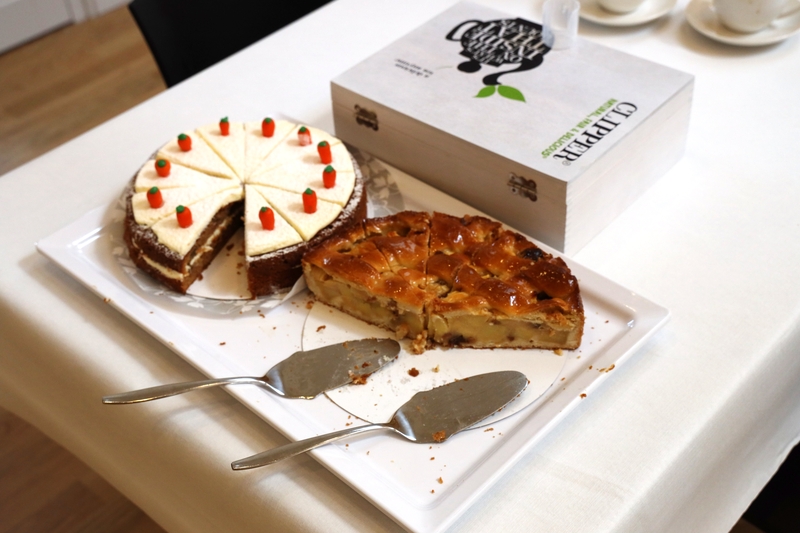
Tea and cake. The carrot cake was very popular!
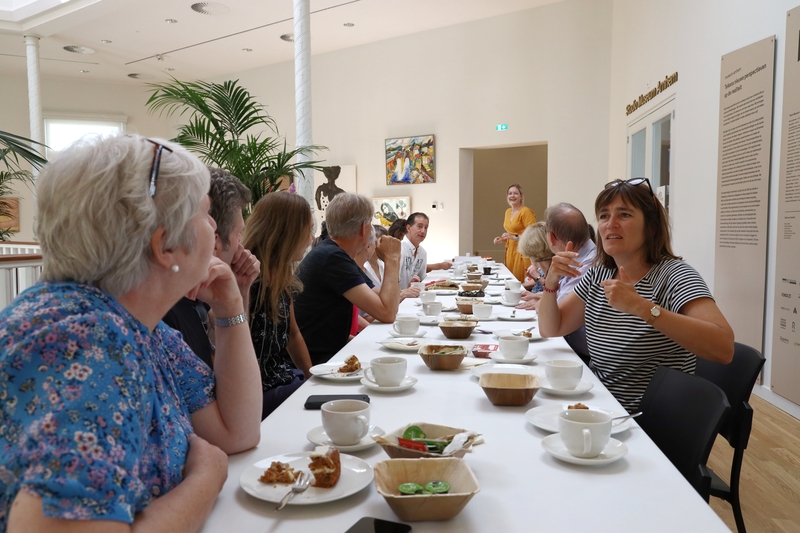
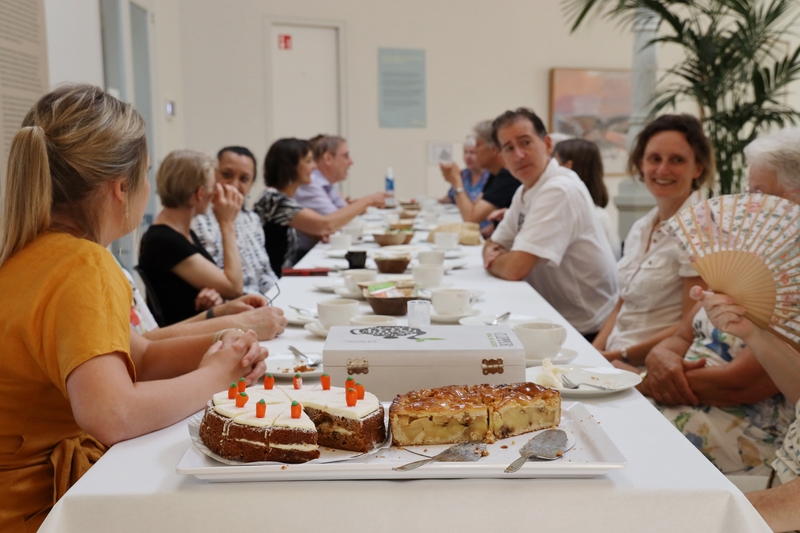
Catching up with each other again after a long time.
‘Just take a little fabric and make some art.’ The guide makes it sound so easy!
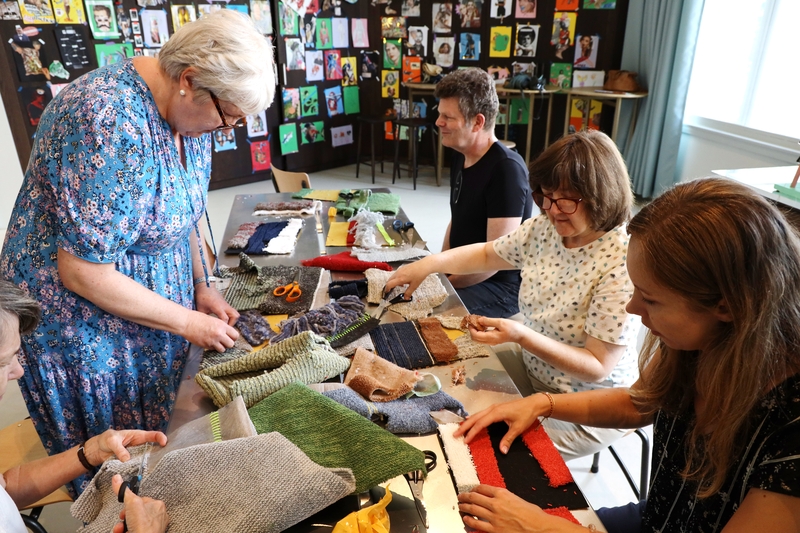
Hard at work during the creative workshop.
(Photos on this page by Hans van Bemmelen)

At the beginning of August, the sad news reached us that former SENSE member Paul Osborn had died. Paul was a larger-than-life character with a wealth of experience under his belt who described himself as a storyteller, listener, and observer. Mike Gould had the pleasure of interviewing him in 2020, and we share a summary of their conversation below.
You may know Paul Osborn from his somewhat cryptic contributions on the SENSE Forum. But have you perhaps wondered about the person behind these postings? I talked to him to find out about some of the more significant events in a rich working life.
Paul was born in London in 1948. He worked with Voluntary Service Overseas (VSO) teaching English in Algeria before studying social sciences at the University of Kent. The main theme in his life has been the global south or, in Paul’s words, pays en voie de développement. At the age of 23, he was writing on this topic for The Economist Intelligence Unit, and he also wrote (in French) for the magazine Jeune Afrique. Over the years, he has worked for Young Oxfam, the World Bank, the United Nations Association, the UN Food and Agriculture Organization, the International Labour Organization, Jamaica.gov and Spore, the bimonthly magazine of the Technical Centre for Agricultural and Rural Cooperation (CTA). He came to the Netherlands in 1976 and has been a member of SENSE since 2013.
Paul calls his company Mediateurs/DoingWedges. He explained why. The first part is easy: he has often played the role of mediator, including in the Northern Ireland peace process, in Eritrea and Indonesia. The wedges refer to the concept of climate stabilization wedges – 25-billion-tonne ‘wedges’ that need to be cut out of predicted future carbon emissions in the next 50 years to avoid a doubling of atmospheric carbon dioxide over pre-industrial levels.
Paul has been a media man and mediator since 1965, working on post-CO2 transitions, energy, finance, agriculture, technology upscaling, and storytelling. He has a reputation as an open, creative writer and filmmaker. The projects he is most proud of working on are the UPSCALE Safe Water Review, resulting in the 300in6 film Delivering Desire in 2012; the UN’s 1992 action plan for sustainable development entitled Agenda 21; The World Bank Sustainable Energy Report in 2004; the film Lighter Burden, Brighter Future – Energising Pacific Islands in 2008; Out of the Shadows: The Energy Transition of Indonesia in 2009; and a working group on Sex and Gender Equity in Research, resulting in a paper presented at the 2015 conference of the European Association of Science Editors (EASE).
Paul has close connections with a city that has been in the news a lot lately: Wuhan. Early in October 2004, Paul arrived in Wuhan. He was there to report on renewable energy in China, facilitated by the World Bank. He was met by the directors of leading Chinese assemblers of solar panels and batteries, as well as several minders, watchers and mediators. He later wrote a book for the World Bank and made films about a generic path towards renewable energy which were shown to millions of viewers on Chinese national television and BBC World.
Paul was also a supporter of social justice, particularly when it came to internet access. The World Wide Web Foundation’s ‘Contract for the Web’ was not launched until 2019. But back in 1984, when international NGOs from four continents formulated the Velletri Agreement at Interco to make a computer network that would support social justice activism, Paul commented, ‘The well-being of an individual – and a community – depends on their access to and ability to apply information.’ A sentence that sums up Paul’s lifelong concerns pretty well.

Chances are you are unfamiliar with the acronym PSTEVIN. It stands for ‘Platform sector tolken en vertalen in Nederland’, and it is a platform where stakeholders involved in translation and interpreting in the Netherlands can meet and discuss the shared challenges they face. Since the Society counts many translators and interpreters among its ranks, a SENSE representative usually attends the platform’s biannual meetings. Jasper Pauwels joined the 19 May 2022 meeting as well as the special interim Zoom meeting in June, and wrote this short recap of the discussions.
Education
The education institutions reported they learnt valuable lessons during the coronavirus pandemic and are ready and prepared to go fully online again if necessary. That said, some of them have always offered many online training possibilities. It was nevertheless agreed that some skills are best conveyed in an in-person setting. Students can expect more support to catch up on any education they may have missed during the pandemic.
In the coming years, two of the educational institutions will be working together to offer the first dedicated master’s degree in interpreting in the Netherlands. Practising interpreters can expect courses on particular specialization such as healthcare and asylum procedures to become available as well.
Interpreting
The good news is that both the public and private sectors are in great need of competent interpreters. Those who master the Russian and/or Ukrainian languages will especially have plenty of work – for most regrettable reasons.
One of the biggest challenges for interpreters in the past years was the sudden increase of videoconferencing: many struggled with the technical sides of interpreting online or with the lack of verbal communication during such conversations. As we have all experienced, Zoom meetings are not quite the same as meetings in person, which makes interpreting harder. Moreover, establishing a safe and secure internet connection for all parties in the meeting proved to be a tough problem, too. These problems can be solved, however, and virtual interpreting is expected to stay.
Translation
One of the large efforts from PSTEVIN in recent years was drafting the Convenant Vertaalsector Nederland. Written by translators and translation agencies alike, this document contains best practices for an ideal collaboration between translators and agencies.
The Directorate-General for Translation, responsible for a large part of European translation services, will outsource an increasing amount of work in the future. Translators can group together if they would like to work for the EU directly – given the large volumes to translate, it is not possible for sole traders to apply. However, this does not mean freelance translators cannot work for the EU. The list of current DGT contractors are available here
Media campaign
An idea was proposed during the meeting to set up a media campaign to boost the reputation of the translation and interpreting profession. Media coverage too often focuses on poor rates and difficult working conditions, whereas the advantages of a language career are overlooked. In fact, the need for translators and interpreters will only increase in the years ahead. The media campaign should highlight, among other things, the social importance of translation and interpreting, as well as why they are such rewarding and intellectually challenging careers. This initiative was well received across the board, but organising and financing such an endeavour is easier said than done. The SENSE Executive Committee is currently looking into the most appropriate way SENSE can contribute to the initiative.
If you are interested in the topics covered by PSTEVIN or would like to offer an interpreter’s perspective on behalf of SENSE during future meetings, please contact Jasper Pauwels and Samuel Murray (contact details available in the membership directory on the SENSE website).
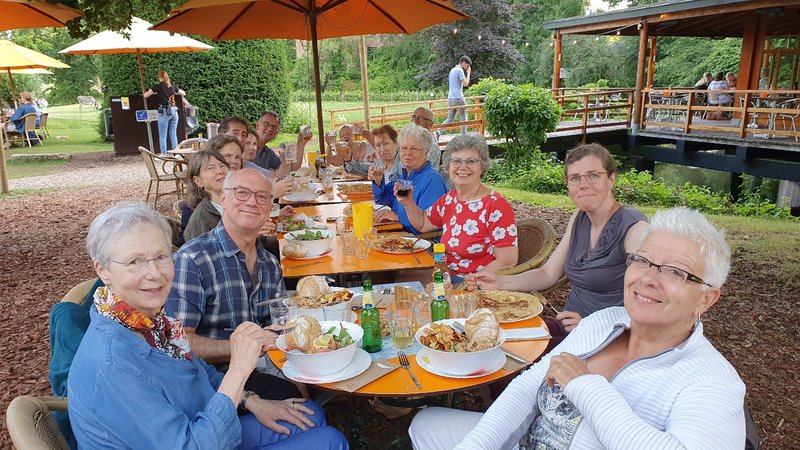
Jenny writes about the Utrecht SIG Social that took place on Wednesday 13 July 2022.
This month, Utrecht SIG met in person for the first time in a year. We followed the same successful formula of our previous social gathering, which we had decided was definitely voor herhaling vatbaar.
We met in the car park at Theehuis Rhijnauwen, where we chatted more than we swapped books. I already have a large pile of books waiting to be read, and had vowed to myself not to take any books home. But how could I resist when one of the books I’d recently put on my ‘to read list’ was smiling at me from the boot of a car?
Tony Parr, who recently announced his impending retirement, had a great selection of business books. I didn’t want any duplicates, but I did find one or two gems among his collection. I think I came away with five fiction and three reference books, so I’ve plenty to read during the long hot summer we’re expecting!
When it was clear no more books were going to swap owners, we ambled to the restaurant. We waited a few minutes while the staff prepared a banqueting table where we could all sit together.

The pancakes were delicious, as was the strawberries and ice cream dessert, which was definitely a sharing portion. Next time, I think I’ll choose a maaltijd salade, they looked delicious and were enormous.
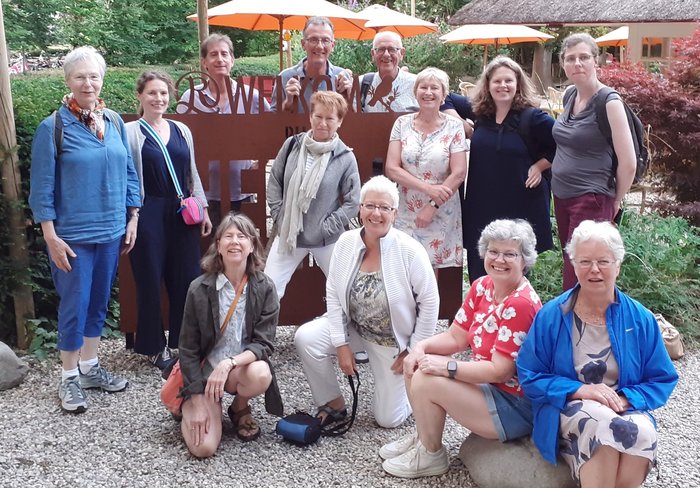
Double the attendance compared to last year and once again, a member from Zwolle had travelled the furthest.
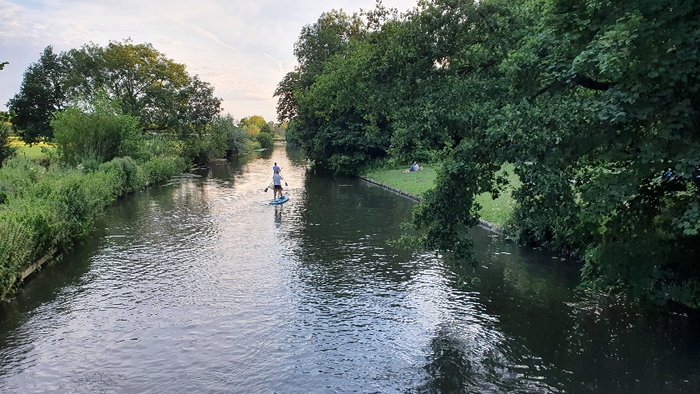
After all that sitting and eating, it was time to get moving again. Walking and talking – another great networking opportunity.

Curtis Barrett guided us on a leisurely stroll around the park where we found some people messing about on the river and this bunch of twigs taking a walk too.
Do come and join us at the next Utrecht SIG business meeting on 14 September and for our social gathering next year. Keep an eye on the SENSE Events calendar for more details.
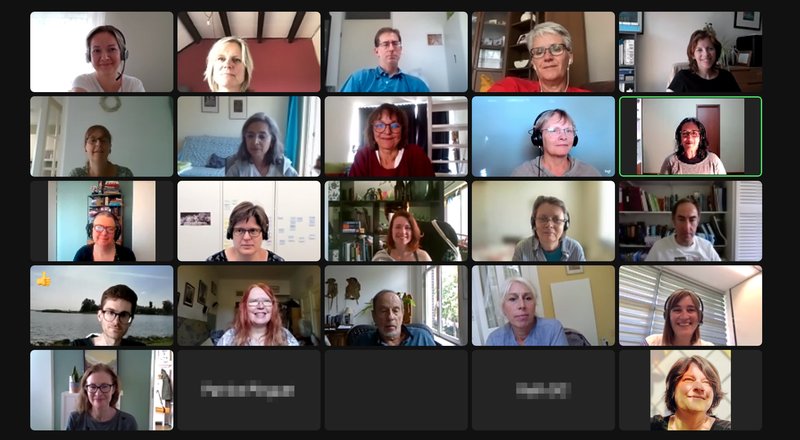
Nandini Bedi shares with us her experience of the Marketing Mindset workshop held on 6 July 2022.
As a part of the SENSE CPD online events, Dr Malini Devadas – scientific editor and mindset coach – was invited to address members about a marketing approach for freelance editors. The session took the form of a short presentation of about 10-15 minutes, after which 45 minutes were devoted to a Q and A. As can be imagined, not only was it was well attended, but there was also a lot to discuss! In her short presentation, Malini focused on how to define the problem, a three-step approach to finding ideal clients and developing the confidence to grow one’s business without complicating life for oneself by giving in to thoughts that get in the way. The slides were shared with those who attended.
Marketing strategies already in use by SENSE members
Some of these are: a website as a means to communicating credibility and legitimacy, posts on LinkedIn and an email newsletter; directly approaching existing clients to inform/check/communicate – or in other words to let them know where you stand in terms of your availability and to remind them that you are there should they need an editor; and lastly, the importance of word of mouth.
Concerns
There were also concerns that came up. Is it possible in this day and age to market oneself if one is not into social media? While Malini herself is very active on social media (check her out on Facebook and Instagram), she does not propagate it as the best or only way. Her approach is to put plenty of content out there in the world, with the idea of reaching out to those who are not yet convinced of their need for an editor. It’s her way of making contact with this particular group, so that they, over time, get to see the value an editor would add to their writing, as well as why paying for this service is worth it. If one is not into social media, then the email newsletter referred to in the previous paragraph, or a request to satisfied clients to pass the message on to colleagues would work just as well. However, as a member pointed out, word of mouth works if one keeps doing the same thing, but in order to introduce a new service, social media would be more effective.
How does one present oneself if there’s more than one service on offer, especially if these are quite different to each other? In other words, how does one target different groups? Malini suggested segregating one’s services over different platforms, and/or clearly defining these as two separate entities on one’s website, (check out hers at mdwritingediting.com.au). And this leads to another question that came up about whether it is more effective to use one’s name or a company name – to which her reply was that she thinks most people who choose her do so because they remember her and her work and not the name of her company. Her homepage is worth looking at to get an idea of her approach.
How does one get one’s foot in the door of an institution? Ever thought of offering a free speech in which you present what you do? This is not that different to putting out content about what you do via social media and is therefore a useful strategy for those who aren’t into social media.
The message to take home
To my mind, a very important message that Malini had to give was not to overthink and procrastinate, but to get out there and reach out to as many people as possible with what’s on offer, in the way that suits one best. Start and be aware of what works and what doesn’t. Change strategies if necessary. Use trial and error to go forward. To her mind, just sticking it out over a period of brings rewards. Too many of us give up and that’s the pity. Persistence pays. In the end the ones who don’t give up reap the benefits over time and develop a marketing mindset.
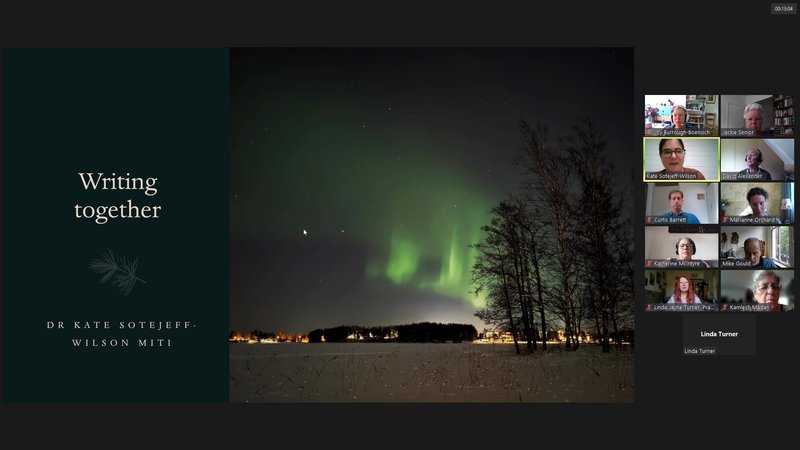
UniSIG report: Kate Sotejeff-Wilson on social writing: ‘Call it a meeting’
At the UniSIG meeting on 1 July 2022, Kate Sotejeff-Wilson talked about her experience of social writing with academics. Kate is a translator and editor, and she also facilitates writing retreats.
Social writing, Kate explained, is when a group of people get together, either online or offline, to write. The writers set goals together, the facilitator tells the group when to start writing and everyone works on their own project until the facilitator tells them to stop. The group then discusses how the writing went.
Kate mentioned a few things social writing is not: a workshop, in that you don’t critique one another’s writing; a boot camp, in that support is more important than productivity; teaching, in that the facilitator is a peer; and a competition, in that the writers are companions rather than competitors.
Who might benefit from social writing? Anyone, said Kate. Academics come to her retreats but so too do creative writers, and they inspire one another. ‘Someone who’s not involved in your work can see things you can’t see yourself.’ Translators could also try social writing, she added, because it gives you the chance to find your own voice and separate your voice from the author’s.
‘Can the writers be writing in different languages?’ Joy Burrough-Boenisch asked.
‘Yes,’ said Kate. Her social writing retreats are in Finnish and English. ‘I’m like a flight attendant: I stand there and say, “Let’s start writing,” in both languages.’
Why might people want to try social writing? Time, space and community, said Kate. Social writing gives you time to focus and the space to create. And as a community you share a commitment to write. You’re away from distractions such as your phone, social media and email. You set a goal – Kate gave the example of 500 words – and share how it went afterwards. ‘You’ll be amazed how much you get done.’
Kate gave three examples of how to go about social writing: informal writing with colleagues, through a professional organization (eg, MET’s Humanities and Social Science special interest group) and structured social writing (eg, a retreat).
Then it was time to discuss the ideal location for social writing, whether online or in person is better and whether social writing would work in the Netherlands. Would people be willing to travel? Would they do as the facilitator says? Would they be willing to pay? Would it be a good idea to limit numbers?
Start small, was Kate’s advice, and find out what works. Start meeting online or in a café and move on to booking a venue if people are interested. For academics, one of the draws of social writing is being able to devote time to writing, away from other responsibilities like teaching and supervision. ‘Schedule social writing,’ said Kate. ‘Call it a meeting!’
About Kate-Sotejeff-Wilson
Dr Kate Sotejeff-Wilson translates from Finnish, German and Polish into English at KSW Translations. She also edits in English for academic and multilingual writers. She facilitates writing retreats online and in person at Ridge Writing Retreats. She was born in Wales and did her history PhD research in London, Berlin, Poznań and Warsaw. Now she is also a Finn and has lived in Finland since 2012. She is chair of Nordic Editors and Translators.

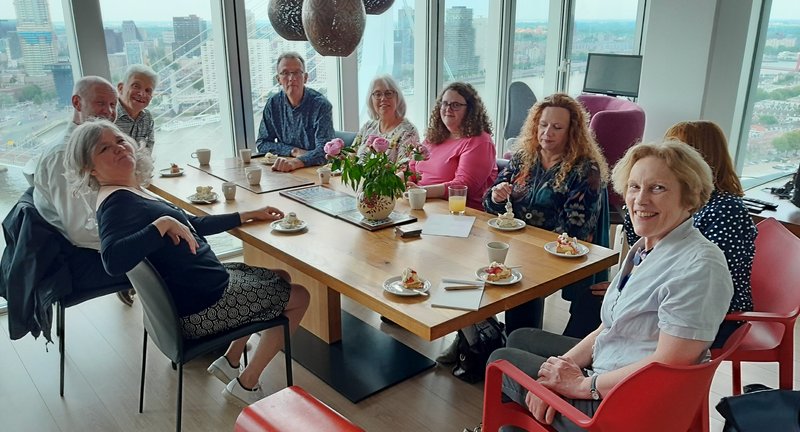
Suzanne Rietveld writes:
On 26 March 2022, I attended the online AGM to see what was happening at SENSE and to meet some of my colleagues. Someone mentioned that the new members seemed less active than expected. This was the moment that I wanted to contribute to the discussion. I explained that this reduced activity should be reviewed within the context of the Covid situation. I told the other members that I registered with SENSE in January 2020 and was eager to see what kind of people I would meet, and what options there would be to learn and interact with mindlike colleagues. All this was disturbed by several lockdowns and restrictions. So, the new members were not less active by choice but by the circumstances of the last two years.
I wanted to put my money where my mouth was and volunteered to host the Zuid Holland SIG on 31 May 2022, advertising the event with the great views from my apartment in De Rotterdam! The event needed a theme, so I decided to give the attendees some tips and tricks on subtitling. That was quite scary, I must confess. Providing the view and the catering was something I was used to, but preparing a talk about subtitling was a challenge because I am not used to speaking in public and I was not 100% sure that I was the right person to share my knowledge.
So, after the invitation was posted online and the first attendees started to sign up, I started to prepare my presentation. I assumed that most of the colleagues would not be experienced with subtitling, other than an odd job in Word, and that some of them would be familiar with the discussion about the specialized skills involved. I wanted to explain more about the technical side of the profession and started my presentation by explaining that my training consisted of a 10-week course of 2 hours per week at ITV Utrecht. So not something I could share within half an hour.
The main issue with subtitling is the fact that reading a sentence takes longer than listening to a sentence, leading to restrictions in reading speed and the number of characters per second. This, combined with a limit in characters per line, often leads to the need to compact the title's content without losing the conveyed message. I use Subtitle Edit myself and showed its settings such as characters per second (around 14–16) and the title's length (between 1 and 8 seconds and with a maximum of 40 characters per line).
I also explained that I prefer to 'spot' the titles by eye instead of by ear. I use the waveform that comes with every MP4 file to do so. The waveform is a graph that shows the speaker's volume and therefore is very useful to mark the start and end of a spoken sentence. Depending on the length and structure of the sentence, you decide how many titles you will need for this particular sentence.
We discussed the ways to shorten the titles, such as leaving out repetitions, stop words, adjectives, adverbials, quantifiers and introductory phrases. The conclusion was that we should only compact the title if this is really necessary. In the end, the afternoon went very well. We all fitted around my table (11 people) and enjoyed the cakes from the local bakery. We got to know each other better, and everyone seemed happy with the shared information.
The overall message was that a subtitle has to convey the right message, and the reader should be able to finish reading the title before it disappears off-screen. Yes, subtitling involves special skills, but don't be afraid to give it a go if a task comes up and offers some flexibility on time spent, and in the worst case, to ask a friend. I proofread and subtitle in English and Dutch ?


